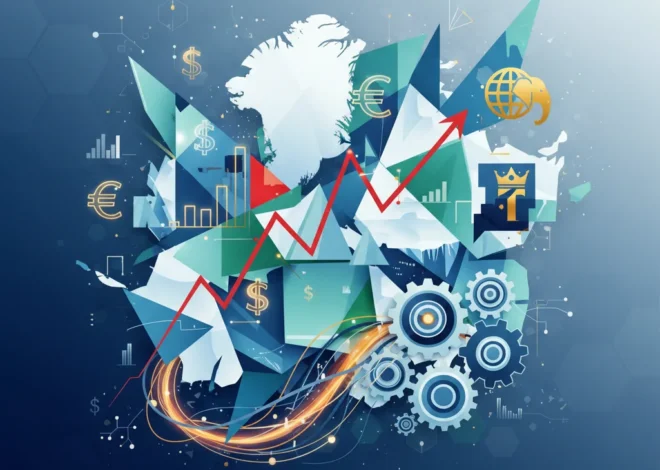
Trump’s Bombshell Claim: Has India Agreed to Halt Russian Oil Imports? A Deep Dive into the Geopolitical and Economic Fallout
In a statement that sent ripples through the corridors of global finance and diplomacy, former US President Donald Trump claimed to have secured an agreement with Indian Prime Minister Narendra Modi to halt India’s purchase of Russian oil. Describing the alleged move as “a big stop,” the claim, if substantiated, would represent a monumental shift in the global energy landscape and a significant development in the economic pressure campaign against Moscow. However, with no official confirmation from New Delhi, the financial world is left to parse the statement’s implications, motives, and potential market impact.
This single, unverified claim sits at the volatile intersection of geopolitics, energy security, and international economics. For investors, business leaders, and finance professionals, understanding the context behind this statement is crucial. It’s not just about oil; it’s about strategic alliances, the future of global trade, and the resilience of the international banking system. Let’s unravel the layers of this complex situation and analyze what it could mean for the global economy.
The Geopolitical Backdrop: India’s Strategic Tightrope Walk
To grasp the significance of Trump’s assertion, one must first understand India’s delicate geopolitical balancing act. Since the onset of the conflict in Ukraine in early 2022, the West, led by the G7 nations, has imposed sweeping sanctions on Russia, with a primary focus on crippling its energy revenues. A key component of this strategy was the oil price cap, designed to keep Russian oil flowing to global markets to prevent a price spike while limiting the Kremlin’s profits.
Amidst this, India emerged as a pivotal player. While maintaining its strategic autonomy and long-standing ties with Moscow, India dramatically increased its imports of Russian crude oil, available at a significant discount. This decision was rooted in pragmatic economics. For a nation of 1.4 billion people, where energy security and inflation control are paramount economic objectives, access to cheaper energy is a non-negotiable priority. According to data from energy cargo tracker Vortexa, Russia became India’s top oil supplier, with its share of Indian crude imports surging to around 40% post-2022, up from negligible levels before the conflict.
This strategic purchasing has allowed India to cushion its economy from the worst of global energy price volatility, a move that has been a cornerstone of its recent economic management. Therefore, any decision to abruptly halt these imports would represent a radical departure from its established policy and would come at a considerable economic cost.
Hargreaves Lansdown Enters a New Chapter: A Founder's Legacy and the Future of Fintech
Analyzing the Economics: The Financial Lifeline of Discounted Crude
The financial implications of India’s Russian oil trade are substantial. The discounts on Urals crude have reportedly saved India billions of dollars, directly bolstering its foreign exchange reserves and helping to manage its current account deficit. This has a cascading positive effect on the entire Indian economy, from lower fuel prices for consumers and businesses to reduced input costs for industries.
To visualize this dramatic shift in India’s energy sourcing, consider its top crude oil suppliers before and after the surge in Russian imports.
India’s Shifting Crude Oil Import Landscape
| Rank (Pre-2022) | Supplier (Pre-2022) | Rank (2023-2024) | Supplier (2023-2024) |
|---|---|---|---|
| 1 | Iraq | 1 | Russia |
| 2 | Saudi Arabia | 2 | Iraq |
| 3 | UAE | 3 | Saudi Arabia |
| 4 | USA | 4 | UAE |
| 5 | Nigeria | 5 | USA |
Note: Rankings are illustrative of the general trend, with specific monthly positions fluctuating. The key takeaway is Russia’s ascent from a minor supplier to the top position.
A reversal of this trend would force India back into the more expensive spot markets or to increase purchases from its traditional Middle Eastern suppliers. This would inevitably lead to higher import bills, putting pressure on the Indian Rupee (INR) and potentially stoking inflation—a major concern for any central banking authority. The impact would be felt across the stock market, particularly in sectors sensitive to energy and logistics costs.
Potential Market Reactions and the Fintech Frontier
If this unconfirmed news were to morph into official policy, the shockwaves would be felt across global markets. Here’s how different asset classes and sectors could react:
- Commodity Trading: The most immediate impact would be on the oil markets. A sudden drop in Indian demand for Russian Urals crude would widen its discount relative to global benchmarks like Brent. Conversely, India re-entering the market for Middle Eastern and other crudes in a bigger way could put upward pressure on Brent and WTI prices, impacting global inflation. This creates a complex scenario for commodity trading professionals.
- Stock Market: Indian refining companies, which have benefited from processing cheaper Russian crude and exporting refined products, could see their margins squeezed. Their stock valuations would likely come under pressure. Conversely, global shipping firms that have pivoted to the “shadow fleet” transporting Russian oil might see a downturn in business.
- Currency Investing: The Indian Rupee could face downward pressure due to a potentially widening trade deficit. The Russian Ruble would also be negatively impacted by the loss of a crucial source of hard currency revenue.
This geopolitical tension has also shed light on the underlying financial plumbing of global trade. The weaponization of the traditional banking system and SWIFT network has accelerated the search for alternatives. The India-Russia trade, for instance, has experimented with various payment mechanisms, including rupee-rouble arrangements and payments in other currencies like the UAE dirham. This highlights a broader trend in international finance: the growing interest in resilient payment systems. This is where discussions around `financial technology` (fintech) and `blockchain` become relevant. Nations under sanctions or those seeking strategic autonomy are actively exploring Central Bank Digital Currencies (CBDCs) and blockchain-based trade finance platforms as potential long-term solutions for conducting international trading outside the direct oversight of the traditional, Western-dominated banking infrastructure. While still in nascent stages, this crisis is a powerful catalyst for innovation in `fintech`.
The Great Market Melt-Up: Are We Riding a Wave of Innovation or Heading for a Fall?
The Global Ripple Effect: A World Readjusting
Beyond the immediate market jitters, a policy shift of this magnitude would have profound, long-term consequences for the global economy.
- For Russia: Losing its single largest seaborne crude customer would be a devastating blow. It would force Moscow to seek other buyers, likely in Asia, and almost certainly compel it to offer even steeper discounts, further eroding its state revenues which are critical for funding its war effort and stabilizing its domestic `economy`.
- For the West: It would be hailed as a landmark victory for the sanctions regime, demonstrating that concerted diplomatic pressure can alter the economic calculus of major neutral powers. It would strengthen the G7’s position and potentially encourage a harder line on sanctions enforcement.
- For OPEC+: India turning back to the Middle East for a larger share of its supply would enhance the pricing power and strategic importance of key producers like Saudi Arabia and the UAE. This could reshape supply-demand dynamics within the oil cartel, influencing future production decisions and impacting global `economics`.
The entire episode serves as a stark reminder for global businesses and investors about the pervasive nature of geopolitical risk. Supply chains, energy costs, and financial stability are no longer purely economic variables; they are deeply intertwined with diplomatic maneuvering and strategic competition.
Frozen Assets, Fiery Debate: Unpacking the €140 Billion Standoff Over Russia's Wealth
Conclusion: A Test of Strategy, Silence, and Speculation
Donald Trump’s unconfirmed claim has thrust India’s delicate energy strategy into the global spotlight. While the statement’s veracity remains highly questionable, it forces a crucial conversation about the future of global energy flows and alliances. For now, the world of `finance` and `investing` watches and waits for a signal from New Delhi.
The reality is that India’s energy policy is dictated by a complex set of variables, with national economic stability at its core. A move as drastic as a complete halt to Russian oil imports would be a tectonic shift, not a casual agreement. For professionals in `trading`, `banking`, and investment management, the key takeaway is the importance of separating political rhetoric from economic reality. The ultimate truth will not be found in a campaign trail soundbite, but in the cold, hard data of tanker movements, trade balances, and official policy circulars. Until then, this remains a compelling, high-stakes story of speculation in a world grappling with a reordering `economy`.


